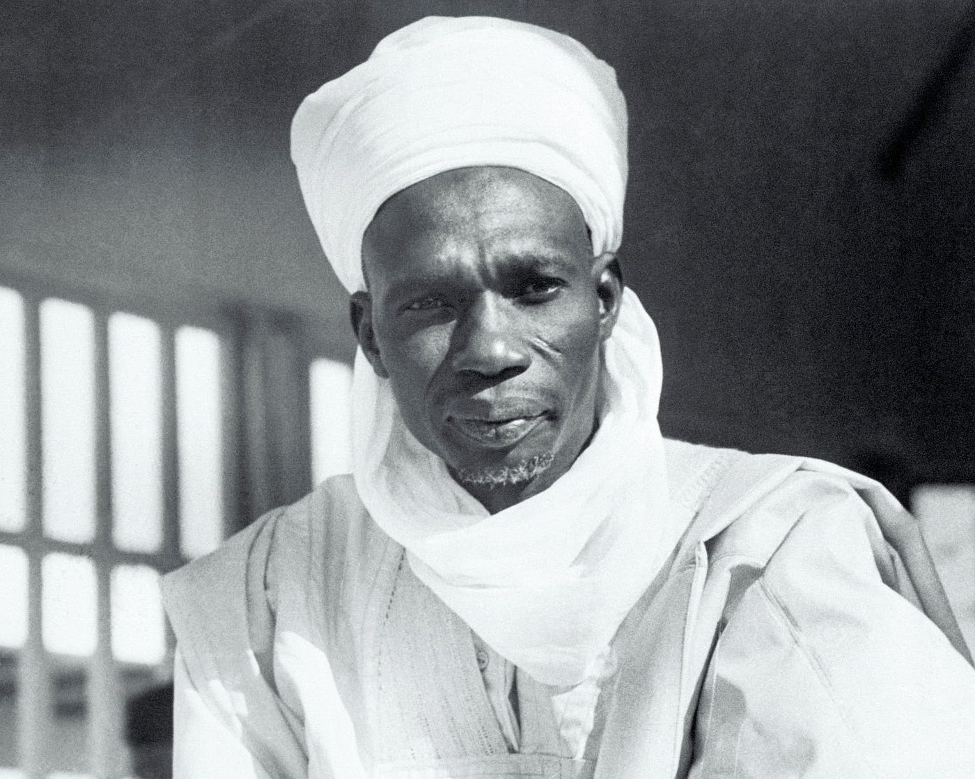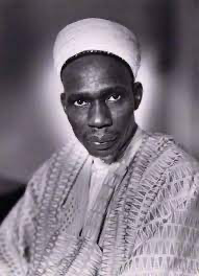
Early Life
Abubakar Tafawa Balewa was born in December 1912 in December 1912 in the village of Tafawa Balewa, in modern-day Bauchi state. According to Tafawa Balewa’s family oral history, his paternal grandfather Isa was murdered in the presence of his family by his rival’s agents. As a result, Isa’s widow then took her infant son to Bauchi, where the Madawaki (Commander of the army or minister of defense) of Bauchi took her in. He was his father’s only child. Thus, the name of his birthplace was appended to Abubakar’s name (Abubakar Tafawa Balewa). Tafawa Balewa village takes its name from two corrupted Fulani words: “Tafari” (rock) and Baleri (black). This may have contributed to the “Black Rock” nickname he acquired in later life. Although it is widely (incorrectly) presumed that he was Hausa, Balewa’s father Yakubu Dan Zala was in fact of Bageri ethnicity, and his mother Fatima Inna was Fulani (Umar, 2011).
Legendacts
Abubakar Tafawa Balewa
Nigerian nationalists and statesmen who played a key role in Nigeria’s independence movement (1957-1960).

Childhood (primary school years)
Abubakar Tafawa Balewa was among the pioneer northerners to acquire western education. Initially he attended Qur’anic school and learnt the first chapter of the Qur’an by heart. For his Western education he attended Bauchi Provincial School.
Teenage (secondary school years)
He was known to be a shy, quiet and not outstanding student academically.
Youth (university years)
The young Abubakar later attended Katsina Teacher Training College (1928- 1933) and graduated with a Third-Class certificate. His best subject was unsurprisingly, English. He became a teacher and irritated by a friend’s remark that no Northerner had ever passed the exam for a Senior Teacher’s Certificate, Balewa duly sat the exam, and obtained the Certificate. Having achieved this feat, he became headmaster of the Bauchi Middle School. He reported that the first white woman he ever set eyes on was Dame Margery Perham (a renowned academic on African affairs) when she visited Nigeria on an investigation of native administration. In 1945 he and other Northerners.
who would later play key roles in the political landscape of Nigeria (including Aminu Kano) obtained a scholarship for further studies at the University of London’s Institute of Education (1945-1946), where he received a teacher’s certificate in history (Umar, 2011).
Career & Achievements
When Abubakar Tafawa Balewa returned to Nigeria, he said he now saw the world with “new eyes”. The young Abubakar noted that he “returned to Nigeria with new eyes, because I had seen people who lived without fear, who obeyed the law as part of their nature, who knew individual liberty” (Umar, 2011). Consequently, he was made Native Authority Education Officer. Although Balewa was not politically overt, he founded an organization called the ‘Bauchi Discussion Circle’ in 1943, and was elected vice president of the Northern Teacher’s Association (the pioneer trade union in Northern Nigeria).
On his return in 1946 he was elected to the House of Assembly of the Northern Region and in 1947 was one of its five representatives to the Central Legislative Council in Lagos. He was reelected to the assembly in 1951 despite the hostility of some conservative emirs of the generally Muslim north. From 1952 until his death, Balewa served in the federal government. He was minister of works and of transport in the middle 1950s, and then, as leader of the NPC in the House of Representatives, he was made the first prime minister of Nigeria in 1957. After the pre independence elections of 1959, he again became prime minister in a coalition government of the NPC and Nnamdi Azikiwe’s National Council of Nigeria and the Cameroons, and he continued to hold that position after Nigeria was officially granted independence in 1960. As prime minister of Nigeria, he had his powers circumscribed by the federal structure of the government, which reserved more authority for the regions. Balewa proved unable to mitigate the growing tensions of 1964–66, manifested by a partial boycott of the election in 1964, army unrest, and outbreaks of violence in the Western Region. He was killed in the first of two Nigerian army coups in 1966 (Britannica, n.d).
Balewa joined the government in the year 1952, as Minister of Works, and later served as Minister of Transport. In 1957, he was elected Chief Minister, forming a coalition government between the Northern People’s Congress (NPC) and the National Council of Nigeria and the Cameroons (NCNC), which was led by Nnamdi Azikiwe. He retained the post as prime minister when Nigeria gained independence in 1960, and was reelected in 1964. Between 1960 and 1963, he was also in charge of the foreign ministry. In the build up to Nigeria’s independence in 1960, a constitutional conference was convened in 1954 in London. Tafawa Balewa was the leader of the Nigerian delegation which comprised of other key stakeholders in the Nigerian project of whom were Obafemi Awolowo, Nnamdi Azikiwe, and Ahmadu Bello. The three personalities mentioned were regional premiers for Western region, Eastern region, and Northern region respectively. At the 1954 constitutional conference a regional political framework for the country was adopted with all regions accorded a considerable level of political freedom. Further meetings were held in the same regard in London in 1957 and 1958 to draft the constitution with Balewa playing critical role. The position of Balewa and his political contemporaries in pre-independence constitutional conferences also reflected party lines. Each represented a different political party, namely Action Group (West), the National Conference of Nigerian Citizens (East) and the Northern Peoples Congress (North). At the same time, these groups represented Nigeria’s diverse major ethnic groups, namely Hausa and Fulani (north), Yoruba (west), and Igbo (east).
In December 1959, elections were conducted for the Federal House of Representatives across present day Nigeria. The North which was NPC held grounds won 142 seats out the 312 available seats in the election. With the outcome of the elections there was no clear-cut majority for either of the three major political parties.
Thus was the genesis of regional politics in the Nigerian political landscape as regional premiers alongside other prominent political figures guided their regions tenaciously against political encroachment. The control of the federal government was effectively in the hands of the northern political elites of which Balewa was part. The north had the highest number of seats allocated. This gave them an edge over the other regions. Frederick Cooper remarks that “The East and West feared the North which was tightly controlled by an Islamic state” (2002, p.13).
Prime minister Abubakar Tafawa Balewa faced turbulent times while in office. His administration was constantly faced with regional factionalism which threatened his government. Notwithstanding, as Nigerian prime minister, he played crucial roles in the African continent’s post-1960s era. Balewa was highly instrumental in the formation of the Organization of African Unity and exploring avenues aimed at fostering cooperative relationship with Francophone countries. He played a key role in negotiations between Moise Tshombe and the Congolese authorities during the Congo Crisis of 1960 – 1964. During the heydays of apartheid in South Africa, Balewa led a vocal protest against the Sharpeville Massacre of 1960 and also entered into an alliance with Commonwealth ministers who wanted South Africa to leave the Commonwealth in 1961. He maintained cordial ties with the Western countries but maintained an intolerant stand on their policies that were inimical to Africa. For instance, he condemned French plans to use the Sahara as a nuclear test zone on 13 February, 1960. Balewa was instrumental to the convening of the Commonwealth meeting in Lagos in 1960 (British PATHE, n.d.). The essence of the conference was to discuss how to respond to the white supremacist government in Rhodesia’s unilateral declaration of independence.
Other Notable Accomplishments
In the year 1963, Balewa gave an eloquent speech at the Addis Ababa (Ethiopia) inaugural conference of the Organization of African Unity that held all present spellbound. Throughout his tenure as Prime Minister he maintained a thoroughly dignified comportment. He was regard by some his contemporaries as a “perhaps the perfect Victorian gentleman.” He received several awards from the British such as Commander of the British Empire (CBE) in 1955. Balewa was knighted by Queen Elizabeth II in January 1960 and was awarded an honorary degree by the University of Sheffield in May 196
Family & Personal Life
Tafawa Balewa is survived by his four wives Jummai, Umma, Zainab and Laraba, and 19 children. Balewa married Jummai who hailed from present-day Sokoto state when she was a thirteen years old teenager. He equally had a posthumous daughter named Zainab who was born by Jummai two weeks after Balewa’s death. When he was assassinated in 1966, all his widows remarried. However, their subsequent marriages collapsed and they returned to the late Tafawa Balewa’s house in Bauchi to live together. His third wife Hajiya Zainab also known as Hajiya Umma, died earlier this year, 2023, at the age of 73. He had two sons in England prior to his demise, they were comforted and looked after by their headmaster Trafford Allen together with their guardian J.E.B. Hall. At this point also, their school fees at Epsom College were being paid by the military regime of General Yakubu Gowon. Meanwhile, his son at Keffi Government College did not know of his father’s demise until the school caterer broke the news to him. Lastly, Balewa’s children include Mukhtar, Sadiq, Hajia, Uwani, Umar, Ahmad, Haruna, Aminu, Hafsat, Amina, Zainab, Yalwa (widowed early and became an organizer of women’s education), Saude, Hajia Binta, Rabi (resisted early marriage in favour of study), Ali (died aged nine), Jhalil and Hajia Talle Aishatu (now deceased).
Feedback from other people about the subject
Commenting on the political arrangement of 1959 in which Balewa played a key role, Umar Fahad writes:
Balewa was to form a coalition government with the Eastern NCNC (Igbo), becoming Nigeria’s first federal Prime Minister. Bello remained premier of Northern Nigeria. Awolowo was independent Nigeria’s first official leader of the opposition. Until Nigeria became a republic in 1963, a Governor-General—Nnamdi Azikiwe—continued to represent the British monarch. In 1963, Azikiwe became Nigeria’s first President (2011, p.6).
The assassination of Abubakar Tafawa Balewa in 1966 is considered one of the unfortunate events in the annals of Nigerian history. According to Adamu Yalwa Gabi in his article:
“His assassination by the enemies of progress, during a bloody coup d’etat on January 15,1966 in Lagos should be viewed as a capital offence and abomination for bringing an end, life of the Nigeria’s hero who had danced well according to his tune in building a roadmap to socio economic growth of his fatherland in all aspects of human endeavors” (2022, para. 4).
Adamu Yalwa Gabi writes about the Prime Minister Tafawa Balewa posthumously thus:
Sir Abubakar Tafawa Balewa, the first and only Nigeria’s Prime Minister who hailed from Tafawa Balewa Local Government Area in Southern part of Bauchi State could be seen as the number one citizen, commandant or civilian general at the forefront of the battle without any sophisticated weapons at his disposal but honesty and the zeal at heart as the acumen he possessed in securing the country from the shackles of colonial rule to gain independence.
Balewa was nicknamed the Golden Voice of Africa because of his oratory skills; he is one of the three National Heroes of the Nigerian nation.
According to Olusegun Osoba former Governor of Ogun state in an interview with the Daily Trust news paper on 17 April, 2022 said:
Nicknamed the Golden Voice because of his oratory skills, he is one of the three National Heroes of the Nigerian nation (along with Nnamdi Azikiwe and Obafemi Awolowo). Although I was a very young reporter, he knew all of us by first name. Balewa was a father figure and easygoing. He had the air of leadership, but he was not one that would throw his weight. He was a rare leader. It is a pity that he died like that.

2 Comments
You really make it appear really easy along with your
presentation however I find this topic to be actually one thing that
I feel I would by no means understand. It seems too complicated and very broad for me.
I’m having a look forward on your subsequent put up, I will
attempt to get the cling of it!
Awsome info and right to the point. I am not sure if
this is truly the best place to ask but do you guys have
any ideea where to hire some professional writers?
Thank you 🙂